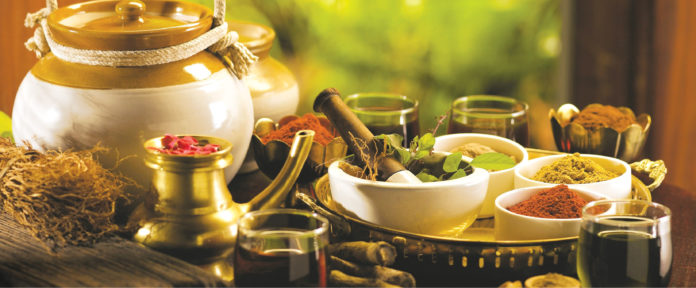It is not the weapon but the confidence that wins a battle. We had always maintained an epic lead when it came to holistic treatments. How to achieve a balanced and healthy life was recorded in sacred texts called Vedas. Blame it on our underconfidence, lack of proper framework or our inherent proclivity to ape the West, the legends of India’s massive lead on this front couldn’t get its due recognition and at times, remained invisible. The Result — many western countries tried to patent Indian herbs to clutch brownie points, for obvious reasons. This article explores the herbal heritage of India for a bride braving a winter wedding.
Indians were aware of the power of mother nature. The proximity of ancient Indians to mother nature had only benefited us. Nature is a provider, a giver and a chemist. Sensitive to our needs, she understands and renders remedies for all maladies that exist on terra firma.
It is only recently the westerners became impressed by the medicinal wisdom of Indians. World Science Centre in New York has proved and accepted the incredible toning effect of triphala, cabbage, rose, camphor and other precious herbs. Today, our erudition is getting acknowledged and our herbal therapies are not only adopted but also practised in the poshest of spas, worldwide.
It has been observed that skin problems arise out of the imbalances of acid-alkaline or oil-moisture contents of the skin. This is also applicable to hair disorders, scalp being an extension of the skin. The versatile ingredients present in nature contain amazing curative properties. She offers various cosmetological concoctions that we fondly segment into cleanser, moisturiser, emollient, toner, nourisher, freshener, astringent, humectant and so on.
Plants and herbal extracts, essential oils and tinctures have aided as cosmetic applications. Some have nourishing or cleansing action, others whip up the circulation, some refine pores, while other freshen up the skin. Usage of harsh chemical laden cleansers, upset the natural acid-alkaline balance and depletes the moisture. Consider your skin a marble. Consistent use of chemical cleaners over its surface will make it rough and stainy over time with lost sheen and even more prone to pollutants. Thus, it is imperative to apply a mild cleanser that not only cleans but also retains the youth of the exterior for longer; the same implies to the skin. It is an accepted fact that the use of soap and water accelerates the aging process of the skin because it washes away the natural oils and removes the protective mantle of the skin.
The enzymes present in some plants acts as a natural preservative and some as hardening agents. From ancient times, our women have borrowed from nature’s bounty to take care of their skin and hair. The arduous task of selecting and grinding choicest of ingredients, that our ancestors did, was a blessing in disguise. Little did they realise that the virgin recipes thus produced would cost a fortune in fabled salons one day, only with added synthetics.
Our wiser ancient equivalents derived most of their cosmetic gyan harnessing the blessed green herbage on Earth. They had to their disposal a super ingredient to pamper tresses and to colour the nails. The colour applied on the calcium-borne nails not only boosted the health of the nails but also its pigment lasted much longer. While its bottled, shallow interpretation — the nail varnish — that we lovingly treasure, is our knight in shining armour today. The former power-integrant was henna, which is known to treat alopecia. A sepian flashback into our childhood would reveal how the lush green fragrant shrub functioned as a hedge to our tiny lawns. An unmindful act of drawing leaves from its strong shoots would ink one’s hand in a rich reddish-brown tint. The tropical henna shrub is a rare sight today. It helps treat scalp disorders, naturally colour the tresses, provide nourishment and shine to the hair shaft and arrest dandruff; an outlaw that messes with every head.
Nature offers perfect solutions to persistent problems. Belittling the potential of natural herbs, women barge into the fancy parlours to beautify their skin and mane. Unfathomable desire of a well-salaried Indian to compulsively shell out on an expensive treatment, falling prey to gorgeously packaged chemicals with interim effects, or a discounted deal; costs heavily. Owing to the domino effect, the phenomena worsens during the winter wedding season. The bottled fancy international brands give little respite but does not diagnose the catch to the core. Relaxes the epidermis superficially similar to allopathy, alleviating the symptoms but not the disease.
Averting the risk of being judgemental, we also approve of the fact that skin and hair needs special care during the dry winters. And if the bride is going to brave the winters, then better replenish your armoury with an au naturel gear.
As the temperature dips, dry skin woes begin to soar. Itchy flaky scalp, fine lines and rough-textured derm becomes uncontrollable, once the situation slips out of hand.
What most of us tend to forget is that our hands are on display all the time. While writing, holding a book or even while making gestures. A wrinkled, rough hand with chipped nails shatter the prim and proper illusion we create of our personalities. Age can show up on hands quicker than most parts of the body. The skin at the back of the hand is thin and soft while on the palm is thick and rough. Palms have no sebaceous gland thus it has no natural lubrication and can become dry and rough. The rigorous washing of the hands multiple times a day only compounds the problem. Herbal answer to this malady is rubbing a mixture of sugar and lemon juice until the granules of the sugar dissolve completely. Rinsing hands with water post this regime will lead to baby-soft hands that everyone envies.
Honey, a powerful moisturiser prevents moisture loss being a natural humectant. A winter-bride can combine the goodness of honey and apricot for a peel-off pack that aids in porcelaining of the skin. Discouraging facial hair and closing the enlarged pores are the other bonuses that the duo offer.
Start your day by giving yourself a sesame oil massage before the daily morning shower. This will increase the blood circulation in the body and reduces stress.
When bathing or washing your face, make sure that the water is not very hot, as it rips away necessary oils from the skin. Sesame is rich in omega 3 fatty acids that makes it high on antioxidant, antifungal, anti-inflammatory and antibacterial properties.
No girl wants a cracked and rough heel. Pamper your feet just before going to bed by soaking them in a hot bath with dry ginger or a combination of eucalyptus and lavender essential oil. Gently rub a moist pumice stone on the soles to scrape away the dead skin cells. Moisturise the feet with castor oil before covering them in a pair of socks and go off to bed. The anti-inflammatory nature of ginger is known to reduce stress and induce a good night’s sleep.
Turmeric, a germicidal treatment is a skin softening agent. It encourages the skin to glow from within which makes it a part of pre-bridal shower at various ceremonies. Turmeric combined with lemon, into a pre-bath gel imparts excellent softness and smoothness to the skin as well as cleanses it thoroughly. It forms a screen between the skin and the dehydrating effects of soap and water.
Indian women for ages have advocated the use of gram flour, mixed with wheat husk and milk for cleaning their skin. Wheat-husk has a gentle derm-abrasive effect and clears the dead epithelial cells for a brighter looking skin. Rosewater is an astringent used to close pores and tone the skin. It slows down the aging process of the skin.
A natural vegetation of a place is God’s gift to its natives, hence the existing herbal treasure should be the preferred choice in bold and capital. Most chemical compositions that claim to be ‘all natural’ come with an asterisk. There is always a clear boundary between compositions that ‘visibly reduce the appearance of fine lines’ and those who ‘reduce the appearance of fine lines’. The quests for natural beauty that enticed many, still remains a mystery. Though were answered centuries ago in the ancient treatises of India, through Ayurveda. The land of snake charmers had always pioneered the territory of herbal remedies.










